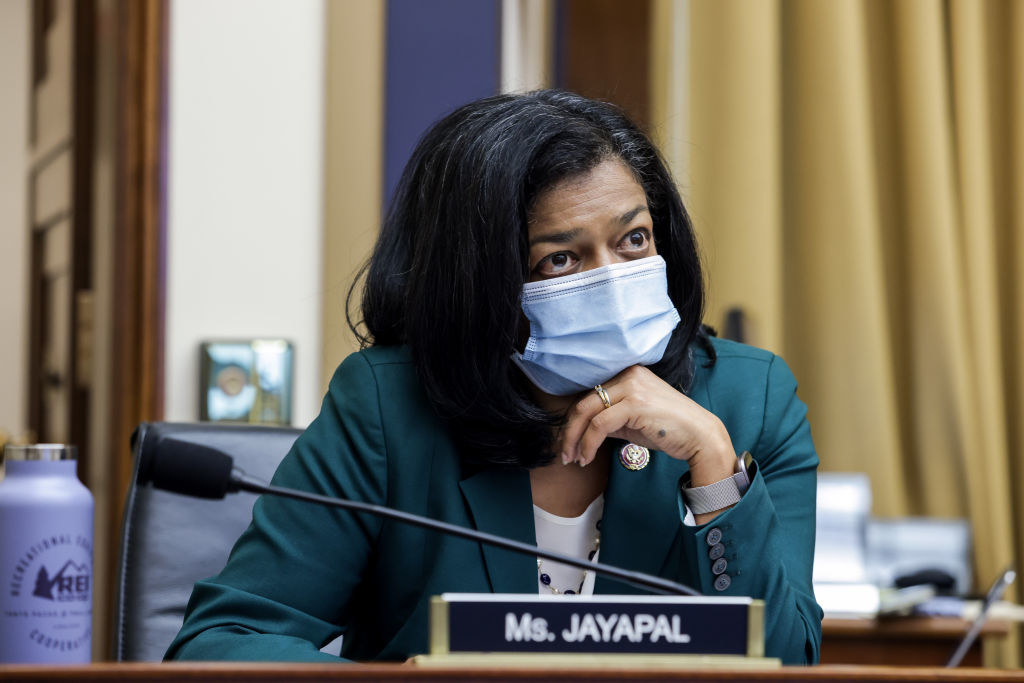
WASHINGTON — Earlier this month, after a string of losses across the country, House Speaker Nancy Pelosi declared that Democrats had a mandate and wrote to her members encouraging “unity.”
“Congratulations on your victory! Thank you for contributing to the success of a Biden-Harris mandate. … Let us all be advocates for unity in the Democratic party, where our values are opportunity and community,” she said in a letter to fellow House Democrats, underlining, in a very on-brand Pelosi move, “unity” in the two words.
Instead, House Democrats have spent the weeks since Election Day fighting with each other, intermittently pointing fingers and arguing that disagreements about what caused their losses should be kept internal.
Democrats had predicted they would pick up new seats in the House this election. Instead, eight incumbent House Democrats have lost their races, and not a single Republican has lost their seat.
Though some races have not yet been called, the party is expected to secure about 222 or 223 of the 218 seats necessary to control the House, their slimmest majority since World War II.
The party hasn’t coalesced around a clear answer about why and doesn’t seem poised to do so. Moderates have argued that progressive policies allowed Republicans to brand them as socialists, and progressives have argued it was moderates’ own fault for not campaigning strategically during the pandemic. Each side feels they have enough evidence to support their own view and there are no signs of any serious soul-searching for the party as a whole.
BuzzFeed News has journalists around the US bringing you trustworthy stories on the 2020 elections. To help keep this news free, become a member.
Democrats seem hesitant to even acknowledge their losses; Pelosi has said it was a “challenging” election with Trump at the top of the ticket but has otherwise argued Democrats retained control of the House for a reason. It’s a mistake that could doom the party even further, considering history is not on their side going into 2022, as the president’s party has consistently lost seats during the midterm elections.
On a caucus call not long after Election Day, Rep. Abigail Spanberger, a first-term member representing a Virginia swing district, spoke up with her own take on how the election had played out.

“If we are classifying Tuesday as a success from a congressional standpoint, we will get [fucking] torn apart in 2022,” Spanberger said, according to an audio recording obtained by the Washington Post. (The Post’s audio bleeps out Spanberger’s curse, unfortunately.)
The number one concern she heard from people in her district, Spanberger told her colleagues, was about defunding the police — an idea, she argued, that Democrats don’t even support. While many Democrats and activists have used the slogan to call for reforming and demilitarizing police forces, some Democrats, including progressive members of Congress, do support fully defunding police forces.
“I've heard from colleagues who have said, ‘Oh, it's the language of the streets. We should respect that.’ We're in Congress. We are professionals. We are supposed to talk about things in the way where we mean what we're talking about. If we don't mean we should defund the police, we shouldn't say that,” she said. “We want to talk about funding social services and ensuring good engagement in community policing. Let's talk about what we are for, and we need to not ever use the words ‘socialist’ or ‘socialism’ ever again.”
The call, like so many House Democratic calls before it, was live-tweeted by several political journalists, leading some members to tell their colleagues to stop leaking. But not hashing out the party’s issues publicly seemed to be the only thing all Democrats could agree on in the days after the election.
Jeffries comes back on to tell people to stop leaking and that reporters aren’t your friends! 😢
The resistance from Democratic leaders to engage with some of the conversations about where the party has failed infuriates activists, who want to be a part of open discussions about how to win nationally.
“In no way should we be viewing what happened in the House and Senate this election as something that we can just brush off and not be concerned about and just have conversations about behind closed doors,” Evan Weber, the political director for progressive activist group Sunrise Movement, said in a recent interview with BuzzFeed News. “We have a real white nationalism problem in this country. We have a real problem with the way that the Republican Party has weaponized xenophobia and racism and tries to divide people against each other. And the fact that Democrats haven't been able to come up with a compelling argument to combat that … is deeply, deeply troubling and problematic, and inexcusable, frankly.”
Weber added, “There are lots of people, particularly activists, particularly organizers on the ground, who've been sounding the alarm about the Democratic Party's sort of weaknesses and failures up until this point that certainly should be a part of that conversation.”
Analyst Kyle Kondik of Sabato’s Crystal Ball said he, like other experts, thought it was likely Democrats would pick up seats this cycle. Several factors look to have contributed to that miss, including somewhat inaccurate polling and a small but significant group of people who split their tickets, voting for Biden for president but then voting for Republicans in Congress and on the state and local levels.
Ideologically, Kondik said, there weren’t clear patterns about who won and who lost, which contributes to the difficulty of having a real reckoning in the increasingly polarized party.
More moderate Democrats like Reps. Max Rose of New York and Ben McAdams of Utah lost their races in swing districts, but so too did progressive Democratic candidate Kara Eastman in Nebraska. Progressive Rep. Katie Porter won comfortably in her California swing district, while Spanberger barely held on in Virginia, as did fellow moderate Rep. Conor Lamb in Pennsylvania.
“I think after an election like this, I think it's fair to say that you know with a fairly divided result that both parties have strengths and weaknesses that they need to think about,” Kondik said. “But I will say this, based on history, the Democratic House majority is in serious trouble [in 2022].”
Rep. Pramila Jayapal, the cochair of the House Progressive Caucus, said the party needs to have a “big conversation,” but added that it’s easier “to have a real conversation” away from the public eye.

Still, she thinks the problem is organizing in communities of color and really turning out voters who could be reliable votes for the party but for whom the party hasn’t delivered in recent years.
“The reality is many of us have been screaming from the rooftops for a long time, about the need to, number one, organize year-round, not just right before the election, but actually spend money investing in organizing infrastructure that reaches out to what should be the base of the Democratic Party,” she said. “In other words, not those white conservative voters that may or may not vote for us, but you know, women, moms, as well as brown and Black folks who take a lot more convincing because they really haven't seen results being delivered for them.”
If you have a news tip, we’d like to hear from you. Reach out to us via one of our tip line channels.
Rep. Ami Bera of California, the fundraising chair for the moderate NewDem Action Fund, said in an interview with BuzzFeed News that he was disappointed by the election results.
“I described the election a little bit different than Speaker Pelosi,” Bera said. “I think our goal for many of us as Democrats is not to have any of our colleagues lose. So by that metric, you know, we lost some really valuable members of Congress, and for that I'm sad, and that bothers me.”
Still, Bera said he didn’t see what Democrats could have done differently in several races they lost, pointing to Rep. Joe Cunningham’s loss in South Carolina.
“There's nothing about his campaign that … we could have improved on — [we] raised resources to get his message out — and at the end of the day, he lost by one percentage point in a district that I bet Trump is gonna win by 10 to 13 points,” Bera said. “So, you know, that's just tough terrain.”
But the party clearly needs to better understand some voters of color, Bera said, who broke in higher numbers for Trump this cycle than they did four years ago.
“We have to understand the Latinx community a little bit better, and because Donald Trump expanded his vote total with the Latinx community, and to the life of me, I don't understand how he would do that or how he could do that, but he did, and, you know, also with African American men,” the lawmaker said. “So I think this is a deep dive for all of us as a party to better understand those communities, to make sure we're speaking directly to the issues that they care about, and obviously, using effective tools of communication.”
Rep. Alexandria Ocasio-Cortez has also been open about discussing Democrats’ communication failures this cycle. (Notably, when Ocasio-Cortez says “defund the police,” she means it. Last week, after Sen. Joe Manchin tweeted, “Defund the police? Defund, my butt,” Ocasio-Cortez posted a picture of herself from the State of the Union glaring at Manchin while he clapped for Trump, which garnered more than 570,000 likes.)
https://t.co/4D4LVOyYhc
In the weeks since Election Day, she has argued that moderates were not digitally strategic enough during their campaigns.
“These folks are pointing toward Republican messaging that they feel killed them, right? But why were you so vulnerable to that attack?” Ocasio-Cortez told the New York Times earlier this month. “Our party isn’t even online, not in a real way that exhibits competence. And so, yeah, they were vulnerable to these messages, because they weren’t even on the mediums where these messages were most potent. Sure, you can point to the message, but they were also sitting ducks.”
And Bera said he and his caucus members aren’t just brushing off Ocasio-Cortez’s advice.
“I think there's something for all of us to learn, obviously,” he said, adding that he doesn't think it was a question of progressives versus moderates. “I appreciate Representative Ocasio-Cortez and what she's able to do in terms of, you know, communicate with younger folks and motivate younger folks, and there's something that we can certainly learn from them.”
Pelosi, for her part, has denied that the tension in the caucus will cause any issues when the party gets to governing. “We always have a beautiful dynamism in our caucus,” she said at a recent press conference. “I would say we have a healthy difference of opinion within our caucus, but not in any way to be problematic in how we legislate.”
“There may not be an answer. It may be that they’re screwed.”
The party is currently searching for a new leader for the Democratic Congressional Campaign Committee, which heads up House Democratic organizing and recruiting for each election cycle. Rep. Cheri Bustos of Illinois, who led the DCCC this year, had preached a moderate Democratic message focused on winning and holding on to seats in swing and Republican-leading districts and instituted a blacklist on consultants who worked on (often progressive) campaigns challenging Democratic incumbents. After only narrowly winning her own race, Bustos announced she would step down from the DCCC at the end of her term. Reps. Sean Patrick Maloney of New York and Tony Cárdenas of California are vying for her role, and Roll Call has reported that both have said they are open to lifting the blacklist, which had infuriated many progressives.
Democrats’ looming problems don’t end, however, with the coming midterm elections: As FiveThirtyEight reported this week, Republicans won almost every election where redistricting was at stake, meaning the GOP will have the ability to draw congressional districts in their favor, securing their electoral advantage for years to come.
“There may be nothing that Democrats can do to hold on to the House, given the weight of history. But they really need to think about what can they do as a majority to hold that majority? And that, to me, requires soul-searching,” Kondik, of Sabato’s Crystal Ball, said. “I don't know what the answers are. There may not be an answer. It may be that they’re screwed.” ●

